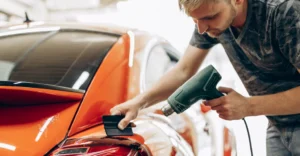It’s never a good feeling when you glance at your car’s temperature gauge and notice it’s creeping into the red only to see it drop back to normal a few moments later. A car that overheats and then cools down repeatedly can be a sign of something small or the start of something serious.
While your engine’s cooling system is designed to regulate temperature, certain issues can cause it to fluctuate. In this blog, we’ll explain 10 common reasons why your car might be overheating and then cooling down, how to spot the symptoms, and what to do next to avoid engine damage.
1. Your Engine Is Being Pushed Too Hard
Driving up steep hills, towing a trailer, or simply revving the engine hard in hot weather can cause the temperature to rise. When the load reduces or airflow improves, the engine cools back down. If this only happens under heavy strain, it’s likely not a serious issue but if it’s frequent or happens under normal driving, dig deeper.
Tip: Keep an eye on engine temperature when driving under load, especially in hot climates. Take breaks and downshift when climbing hills.
2. A Failing Thermostat
Your thermostat controls when coolant flows between the engine and radiator. If it starts sticking opening late or inconsistently your engine can overheat briefly and then cool down when it finally opens. This is a common culprit of fluctuating engine temperatures.
Tip: Replacing a thermostat is a relatively simple and affordable repair that can prevent costly engine damage.
3. Low Coolant Level
Coolant (also known as antifreeze) helps absorb heat from the engine. If you’re running low, especially during warmer months, your car can start overheating intermittently. Once some coolant starts circulating, the temperature might drop again but it’s only a matter of time before it overheats for good.
Tip: Check coolant levels regularly. If it’s low, top it up with the correct type. If it keeps dropping, you likely have a leak.
4. Clogged or Failing Radiator
Over time, radiators can become clogged with rust, sediment, or debris reducing their ability to transfer heat. A clogged radiator might not keep up with cooling demand, especially in traffic or warm conditions, causing brief temperature spikes.
Tip: Radiator flushes every 2–3 years help prevent blockages. If your radiator is damaged or leaking, consider replacing it.
5. Faulty Water Pump
Your water pump keeps coolant circulating through the engine and radiator. When it begins to fail, circulation can become inconsistent. The result? A car that overheats occasionally and then returns to normal.
Tip: Listen for whining or grinding noises from the engine area these can indicate a worn-out water pump bearing.
6. Malfunctioning Radiator Fan
Your car’s radiator fan kicks in when there’s not enough airflow, like during city driving or traffic jams. If the fan motor, switch, or relay fails, the coolant may not cool efficiently leading to temporary overheating, especially when idling.
Tip: If the temperature rises when the car is stopped but drops once you drive, the fan may be the issue
7. Air Trapped in the Cooling System
Air pockets in the cooling system prevent coolant from flowing smoothly. These bubbles often form after a coolant refill or leak and can cause sporadic overheating.
Tip: Bleed the system to remove trapped air. Most modern cars have a bleeder valve or a specific refill procedure to prevent this.
8. Faulty Coolant Temperature Sensor
This sensor tells the engine control unit (ECU) how hot the coolant is, helping manage fan activation and temperature readings. A failing sensor can send incorrect readings making the dashboard gauge spike or drop erratically.
Tip: If the temperature gauge fluctuates but the engine doesn’t show signs of overheating (steam, smells, noise), a faulty sensor might be misleading you.
9. Failing Head Gasket (Early Stage)
In early head gasket failure, exhaust gases can enter the cooling system, causing temporary overheating and bubbles in the radiator. The leak may be small at first, causing intermittent symptoms.
Tip: Look for signs like white smoke from the exhaust, coolant loss with no visible leak, or a milky substance in the oil.
10. Dashboard Temperature Gauge or Cluster Issue
Sometimes, the problem isn’t with the engine it’s with what’s telling you there’s a problem. A faulty temperature gauge or instrument cluster can give false readings, making it look like the engine is overheating when it’s not.
Tip: Cross-check temperature via an OBD-II scanner or with a mechanic’s temperature probe for confirmation.
Is It Safe to Drive When the Engine Temperature Fluctuates?
Short answer: not really. Occasional spikes could point to a minor issue, but they may also be the first sign of a serious cooling system failure. If left unchecked, you risk major damage like a warped cylinder head or a blown head gasket.
Here’s what you should do:
- Check coolant level and condition.
- Inspect for visible leaks or coolant puddles under the car.
- Monitor for unusual sounds, smells, or steam.
- Visit a mechanic immediately if you notice repeated temperature spikes or any performance issues.
Final Thoughts: Don’t Ignore Warning Signs
Intermittent overheating is often the calm before the storm. Whether it’s a simple thermostat issue or an early sign of head gasket failure, addressing the problem early can save you thousands in engine repairs.
If your engine temperature gauge is acting up, don’t wait for a complete breakdown. At MotorHub, we offer professional diagnostics, cooling system inspections, and emergency mobile mechanic services to get your car back to its best wherever you are.
Need Help in the UAE?
MotorHub connects car owners in the UAE with trusted service partners for quick inspections, cooling system repairs, and mobile diagnostics. Book a service today and drive with peace of mind.



